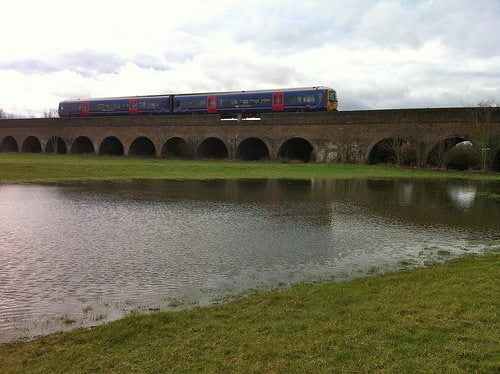

Environment
The floods should impel our essential services to review climate change risks
Seb Beloe, head of sustainability research at WHEB, on how a little-known section of the Climate Change Act could be crucial in responding efficiently to extreme weather in the future.
Buried in the annals of the 2008 Climate Change Act is a provision that gives the government the power to ask certain organisations that are responsible for essential services and infrastructure, like energy or transport companies, to outline how they are planning to respond to climate change, as part of their risk management processes.
Since then, 91 key infrastructure providers, including airports, power stations, water companies and rail companies have reported what they see as their key risks and what they plan to do about it.
These reports, which have until now been gathering dust on shelves at the Department for Environment, Food and Rural Affairs (Defra), have acquired a certain currency as a result of the extreme weather that the UK has been experiencing over recent months.
Network Rail, for example, in its 2011 report highlighted work that had been done around the railway tracks comprising the Great Western Route in the Dawlish area. Parts of this section of line have now been washed into the sea.
In its climate change adaptation report, Network Rail cited the work that it had done to improve the effectiveness of forecasting “potential hazards to the safe operation of trains” in the area. Elsewhere in the report, it put its finger more directly on the issue, highlighting “increased storminess” and its impact on sea defences as an area of concern. Unfortunately, it concluded that this threat was only likely to be an issue over the long-term.
Having had the wettest January in 250 years and with February also starting wet, it may be time to dust off the other adaptation reports and work out just what we need to do to ensure that more of our essential services and infrastructure don’t succumb to this extreme weather.
Seb Beloe is head of sustainability research at WHEB.
Further reading:
UK weather: homes in Berkshire and Surrey evacuated as flooding crisis continues
Met Office: evidence says ‘exceptional’ UK weather is linked to climate change
Dawlish: the Beeching axe’s disastrous economic impact on the south-west
Eric Pickles reveals extra £30m funding for flood repairs
Extra £500m flood spending needed to keep pace with climate change


 Environment12 months ago
Environment12 months agoAre Polymer Banknotes: an Eco-Friendly Trend or a Groundswell?

 Features11 months ago
Features11 months agoEco-Friendly Cryptocurrencies: Sustainable Investment Choices

 Features12 months ago
Features12 months agoEco-Friendly Crypto Traders Must Find the Right Exchange

 Energy11 months ago
Energy11 months agoThe Growing Role of Solar Panels in Ireland’s Energy Future




























